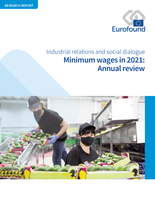The Council today (6/12/2021) agreed its position on a Commission proposal for an EU law on adequate minimum wages in the EU. Fair wages that provide for a decent standard of living are one of the principles of the European Pillar of Social Rights. To improve working and living conditions, this draft law establishes a framework to promote adequate levels of statutory minimum wages, to promote collective bargaining on wage setting and to improve the effective access to minimum wage protection of those workers who are entitled to a minimum wage.
Γλώσσες
Κύριο μενού
Νέα από Εξωτερικό
Αρχική » Νέα από Εξωτερικό
Υπηρεσίες του Ο.ΜΕ.Δ.
Οι υπηρεσίες του Ο.ΜΕ.Δ. παρέχονται στις συνδικαλιστικές οργανώσεις εργοδοτών και εργαζομένων καθώς και σε μεμονωμένους εργοδότες σε επίπεδο επιχείρησης που επιθυμούν να απευθυνθούν σε αυτόν. Μεταξύ των εργοδοτών συγκαταλέγεται και το Ελληνικό Δημόσιο, για τους εργαζόμενους με σχέση εργασίας ιδιωτικού δικαίου στις Δημόσιες υπηρεσίες, Ν.Π.Δ.Δ. και Ο.Τ.Α.
Υπηρεσίες
Στοιχεία επικοινωνίας
Διεύθυνση: Πλατεία Βικτωρίας 7, 104 34 Αθήνα
Τ: +302108814922
E: e-mail: [email protected]
Ωράριο λειτουργίας: Δευτέρα – Παρασκευή, 09.00 – 17.00
Πνευματικά Δικαιώματα - Όροι χρήσης
Copyright © 2014 Οργανισμός Μεσολάβησης & Διαιτησίας All rights reserved.
Unless otherwise stated, the content of this page is licensed Under Creative Commons Attribution-NonCommercial-ShareAlike 3.0



